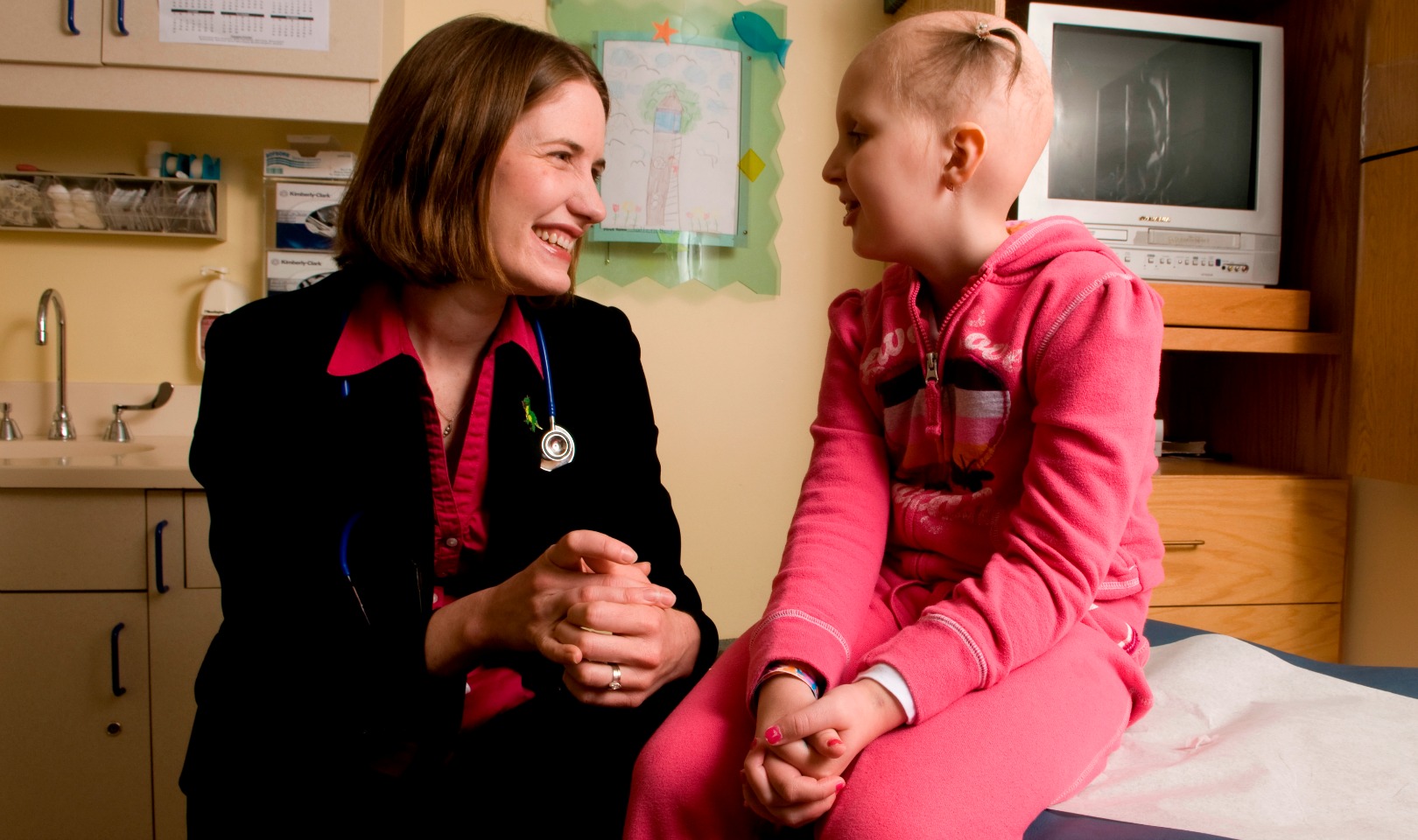Did you know that pediatric cancers are different than adult cancers? The St. Baldrick’s Foundation does one thing: fund pediatric cancer research. You can, too.

St. Baldrick’s Scholar, Dr. Kris Ann Schultz, talking with a childhood cancer patient.
St. Baldrick’s Scholar, Kris Ann Schultz, M.D., M.S., has given the Day One talk. She studies rare childhood tumors at the Children’s Hospitals and Clinics of Minnesota.
“Whether a child has been sick for a day, a week, or a year, it’s a talk no parent is really prepared to have,” said Dr. Schultz.
But as difficult as that first conversation can be, Dr. Schultz is inspired by the way many parents are able to step forward and ask important questions.
“Seldom do parents even ask how this journey will affect them. Their questions are nearly always about how they can best care for, educate, and feed their child during the journey,” she said.
Dr. Schultz said she hopes parents will remember two things from their Day One talk: “This is not your fault,” and “You are not alone.”
Indeed, families of kids with cancer are not alone. Worldwide, every three minutes, a child is diagnosed with childhood cancer. And for these kids, treatment often begins quickly, sometimes within hours of diagnosis.
Unlike adult cancers — which often can be treated on schedules that accommodate work or vacation plans — many pediatric cancers require immediate action.
Why is the treatment timeline for adult cancer patients often more flexible than that for pediatric patients? According to Dr. Schultz, part of the answer may have to do with kids’ boundless energy.
“Most children keep running, climbing and playing, in spite of symptoms that would leave many adults unable to function,” Dr. Schultz said. “Their resilience makes it harder to realize they’re truly ill.” Kids are often diagnosed after showing symptoms such as fever and pain — signs that the cancer has already progressed.
For kids with leukemia, the most common type of childhood cancer, symptoms may not arise until the child’s red blood cell and platelet counts are so low that a blood transfusion is required before diagnostic procedures can be done safely. Treatment is usually started soon after.
“When parents hear the word ‘cancer’ in association with their child, the treatment — the cure — can’t come fast enough.”
Diagnosing childhood cancer is even more difficult in cases where children cannot explain how they feel. Infants and young children may be unable to communicate their symptoms, which can delay diagnosis. By the time cancer is discovered, the need for treatment may be urgent.
The fast-moving world of childhood cancer treatment can be overwhelming for parents and children alike, but Dr. Schultz points out that the rapid start of treatment can also bring comfort to parents facing a new diagnosis.
“When parents hear the word ‘cancer’ in association with their child, the treatment — the cure — can’t come fast enough,” Dr. Schultz said.
With your help, Dr. Schultz and her colleagues are working towards safer and more effective treatments for pediatric cancers. “Children with cancer need better treatments, and they need them now,” Dr. Schultz said.
Like all of us, Dr. Schultz hopes that someday, there is no more childhood cancer, “but in the meantime, we need to ensure each Day One talk starts with hope and each childhood cancer journey ends with a cure.”
Childhood cancer research depends on you! Donate by June 30, and your dollars will be put into the hands of researchers this summer.
Read more about children with cancer on our blog:
- ‘Facing the Bridge’: Late Effects of Grace’s Childhood Cancer Treatment
- Meet Max, Who’s Fighting a Brain Tumor and Raising Money for Childhood Cancer Research
- A Mother’s Thoughts from the Hospital Bedside
- Keeping My Heart Full with Memories of Henry


 SBF
Tweets »
SBF
Tweets »